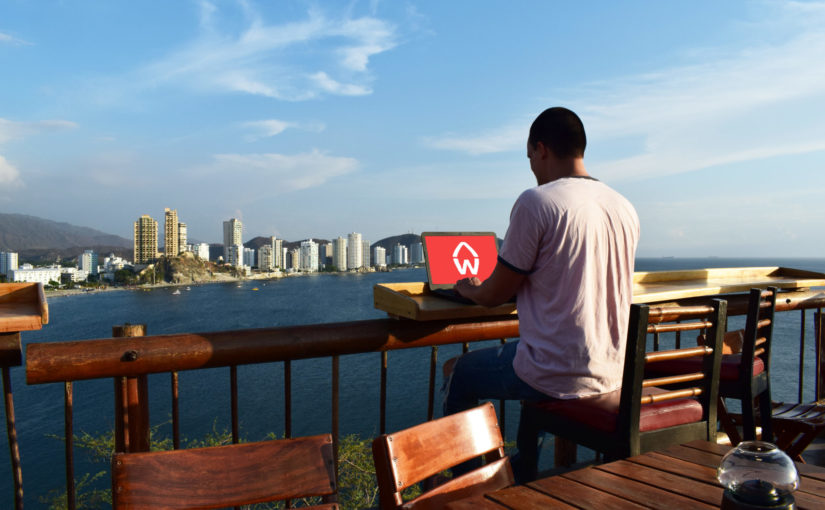Though I’ve been a digital nomad for a while now I’m still learning new things. One thing I recently realized is how people new to the lifestyle seem to think digital nomad is a job description and we make our money this way.
Now, you can call it many things – a lifestyle, a rebellion or even a movement – but it is not a job. That part of it is entirely separate. We get going by writing, freelancing or starting businesses and that allows us to then move around.
So why do people think of it as a job description? I suspect people have this idea because they’ve been sold a myth. Often, it is made out as if it’s not of this world. The way our lives are often portrayed is as if we’ve passed through the looking glass into a magical realm. A place where the sun always shines, the living is easy and we’ve moved beyond capitalism.
But that’s not true. Quite the opposite. The digital nomad lifestyle is dependent on modern capitalism.
We offer products in exchange for a fee.
The first question you should ask when considering the lifestyle is: Do you want to reject capitalism or live location-free? Because unfortunately, you only get to choose one. Let’s look at both in turn.
What to do if you want out of modern capitalism

There are still plenty of people and places trying alternatives to capitalism. Unfortunately, many of those honest attempts have been grouped with the dictatorships, kleptocracies and failed states. That’s certainly true of the countries.
Many of them, like Venezuela and North Korea, you’re better off avoiding. Others, like China, Cuba, Nepal, Vietnam, Nicaragua and Bolivia, are safe to travel through. The thing is, this latter list isn’t anti-capitalist in the sense we’re talking about. You still have to work for a salary or a fee, and there where there is government support you’ll struggle to access it as a foreigner.
So that’s probably not the way to go.
You could try begpacking (please don’t – it’s a shameful practice). Individual self-sufficiency is another way out – though that’s hard work, as you have to learn to do everything. What’s more, unless you’re willing to dumpster dive, or hunt people’s pets, you’ll need to grow your own food. That’s impossible while traveling.
Your best bet is to join a community founded on different principles. I’ve encountered a few over the years – more than a basic search online will reveal. The reason why you can’t find them there is because they’re very careful about recruiting. After all, if they take in the wrong members that can spell their end. For though they might be trying alternative routes to capitalist, they can’t escape the free rider problem. Similarly, they have to remain ideologically homogeneous. Only in that way can they keep their individual and collective goals pointing in the same direction and avoid tearing themselves apart.
Perhaps the best way is to actually ask around about them.
Of course, if you were to join such a community then you won’t get to travel all the time. Instead, you’ll basically be relocating. Not that that’s a bad thing. After all, being a part of a group is important. What’s more, many of these experiments and alternative lifestyles have found gorgeous places to live. As most of these societies aim at self-sufficiency, you’ll get to work with your hands and learn about growing and making things. You’ll also get to see what’s involved in keeping groups like that united.
To be honest, it sounds pretty awesome to me, as you’ll get to see a different way of life. I’ve flirted with joining one or trying to start something like that. But it never turned into anything more. We can imagine infinitely more lives than we can live.
That wasn’t quite what you had in mind? Was it the location-free living that struck your fancy? Then you’ll need to learn to play nice within the rules of capitalism.
What are the rules?

I could write a long list here, but at the risk of oversimplifying it comes down to three ideas – which hold true whether you’re a digital nomad or not. You have to:
- Create something people want to buy.
- Let people interested in your product know you’re offering it for sale.
- Get a good price.
Of course, if you want to travel, as you have to carry your tools with you, you are more limited in terms of what you can create. Not only that, but you have to be able to send your product to wherever your customers are. That’s why the internet has made it so much easier to live on the road travel. It has made many services and products simple to create and transport.
At the same time, working online is hardly the only way people make money on the road. Before digital nomads, there were traveling street performers, living off the money they could busk. Similarly, plenty of people have sold physical goods on locations as they’ve traveled.
Another option is to find jobs as you travel. That’s what I did before I became a writer. I used to stop in places and do whatever job I could find. I tended bars, taught English, worked in a prison, modeled, organized beach parties and signed people up for charities. Other people I’ve met have given massages, run hotels, given tours, worked in mines and so on.
But let’s say, that’s not what you’re after. You like the idea of doing it online and being able to do the same thing wherever you go. I hear you. It does cut down some on the chaos and you do have the opportunity to build a career.
Then the question becomes:
How do you find something you can create online?
This is where most people who discover this lifestyle struggle. They can’t imagine what they can offer. But the truth is, people want to buy a lot of things. There are people who work in data entry or transposing speech to text. There are virtual assistants and programmers. In fact, jobs from which you couldn’t survive back home can be viable in countries where the cost of living is lower.
That’s one of the big advantages of the life. It’s also why I’m still in business as a writer. The first few months I made very little money. Back home I wouldn’t have been able to survive off of it. Where I was, however, both myself and my girlfriend could live off of it.
But really, that’s about the biggest positive influence the digital nomad lifestyle gives you. And sure, there are some jobs which are unique to the digital nomad world – like creating followings on Instagram publishing #travelporn and funding yourself through sponsorship. But the truth is, very few people actually manage to live that way. (Nor is it all it’s cracked up to be).
Even worse, there are a lot of digital nomad hucksters and scam artists offering ‘shortcuts’ to the digital life. A while back there was the dropshipping scam. Now they’ve moved onto teaching how to make money off cryptocurrency and that aforementioned Instagram shtick.
I’ve covered how to protect yourself against scams elsewhere. But to summarize the main lesson, whenever people offer to teach you how to make money doing something, stop and ask: If it’s so easy to make money this way, why are they teaching it instead? If there is no obvious answer, then assume it’s a scam.
A much better way is to stop searching specifically for digital nomad jobs and broaden it to any online job.
Typing a search like ‘what jobs can I do online? Gives you thousands of resources, like this random post I found about online jobs you can start with little or no experience. These guys even specify where you can apply and how to get started. Modify your search to include your specific skill set (What jobs to do as a psychology student, what jobs to do online as a stylist) and you’re bound to find some good ideas.
Before you rush off, first a warning. Whatever you find, remember to be skeptical. The truth is, it pays for the people who write those articles to make things sound easier than they actually are. After all, if I decided to become a digital nomad is the way to escape my unhappy existence, the last thing I want to hear is how hard it is and how long it will take me. What will excite me is anything that tells me it’s easy and quick. And as on the internet is a huge popularity contest based on links and shares, that’s the stuff that drifts to the top.
So take it with a grain of salt. That’s not to say, these things never work, by the way. I’m not trying to burst your bubble (and that’s not just because I want you to share this article!). Instead, things take longer and will be more difficult than they’re made out to be. Be prepared for that.
Get a good price

Let’s deal with things slightly out of order and jump ahead to point three here, as the price you can charge depends on the service you’re offering. When trying to figure out what job to pursue consider two things:
- How popular is it?
- How hard is it to get started?
The more popular something is, the bigger the supply will be. The bigger the supply is, as the economics of supply and demand teaches us, the lower the price becomes. Hence, don’t choose a job that’s popular. Also, don’t only consider how popular something is today, but also how popular it will be in the future.
Does it look like there is a growing fad where everybody wants to do this new thing? Then expect a lot more people to enter the market, compete for the same clients and push down prices.
In effect, this is a variation of when everybody zigs, you should zag. Mark Twain’s said it well. “Whenever you find yourself on the side of the majority, it is time to pause and reflect.”
As for point two, it is actually a good thing if it’s hard to get started or at least looks that way. Yes, it will mean that you’ll have to do far more work, buy expensive equipment, or get a special license. On the other hand, so will everybody else that wants to do the job. That means that once you’re on the inside, you’re going to have to deal with far less competition.
In economics, they call this a high barrier to entry. It is why doctors drive expensive cars, accountants have big houses and lawyers charge exorbitant fees. It is a great way to make sure that you’re going to make decent money. So, when considering what you’re going to do, don’t choose something because it’s easy. Choose something because it’s hard.
At the risk of belaboring the point, here I don’t mean, ‘hard’ as ‘a lot of competition’. ‘Hard’ here means that it’s difficult to enter the market and as a result, fewer people are competing with you.
To illustrate, let’s talk about my choice to become a writer. When I chose this career path, I broke both of the rules I outlined above. I started when everybody else was jumping on the bandwagon, and it’s not hard to get started as a writer. Anybody with a pulse and a laptop can try. As a result, the field is incredibly crowded and the rates people offer are often atrocious.
If I would have chosen a different path which followed these two rules, chances are I would have been a lot further along. In fact, a month doesn’t go by where I consider quitting and choosing to do something else. So consider my life as a warning. Chose something more niche and more difficult to get started in.
Make people aware you’re selling it
Once you have something you can do and it looks like you’re able to earn a decent wage doing so, you’ll need people to actually buy your service. This is where embracing the digital nomad life will count the most against you.
Why? Because one of the most useful things to help you get started in a new field is your network of acquaintances, friends and family. They can offer you suggestions, introductions and can even employ you. That’s why many articles out there claim the vast majority of jobs are found through networking. The thing is, when you start traveling, this network will start to disintegrate as you drift apart.
Of course, there are substitutes to the network online, like freelancing sites. The problem here is that when you join these sites you don’t get to take your reputation with you. So people don’t know how trustworthy, dependable, creative, or insightful you are. Instead, you’re a number in a crowd.
Even worse, the interconnectivity of the internet means there is always somebody willing to do things for less money. This creates a huge downward pressure on prices.
And sure, eventually, you can climb out of the trenches, get noticed and charge more. But that takes time and effort – and more than you expect. In part that is because of what I’ve outlined above and in part because of the psychology of the planning fallacy where we think things will be easier than they are.
So what does all that mean?

To be successful as a digital nomad you have to disentangle the job and the lifestyle. In other words, as the title of this piece suggested, stop seeing digital nomad as a job description.
Once you’ve done that, you can then stop yourself from putting the cart in front of the horse by embracing the lifestyles before you have the means to support it. First sort out your skills, your clients and your income, then hit the open road.
To be clear, there are plenty of people who have done it the other way around. But that does make things far more difficult. You’ll have the following things all at the same time:
- Find out what job suits you.
- Learn how to do that job.
- Support yourself as you develop your skills.
- Learn all the skills involved with long-term travel.
- Build up a new network or connections and friends.
- Discover what gear you need to complete your job.
- Get the right documentation, insurance, bank accounts, etc.
A much better idea is to chop all that into two separate projects. First figure out what job you want to do, learn how to do it, get some clients and start building a new network while you can still rely on the old one. Then hit the open road and learn all the skills you’ll need to live there.
Sure. That’s a lot less exciting. But you’ll be far more likely to leapfrog the bottom rungs of the lifestyle and give yourself a higher chance of success. And take it from me, traveling the world is a lot more fun if you don’t have to stress about how you’re going to afford the next leg of your journey.
Don’t want to wait with hitting the open road? Then go backpack for a few months. Honestly, it is often far more fun to live that way. For a time deadlines, obligations and the work days drop away so you can enjoy the locales and the life. Besides, that’s far closer to passing through the looking glass into that post-capitalist world than being a digital nomad will ever be.
Like what you read? Want to stay up to date with Vagabond Writers? Then follow us on Facebook or Twitter, or join our newsletter.
Need freelance writing done? Check out my portfolio and get in touch!
